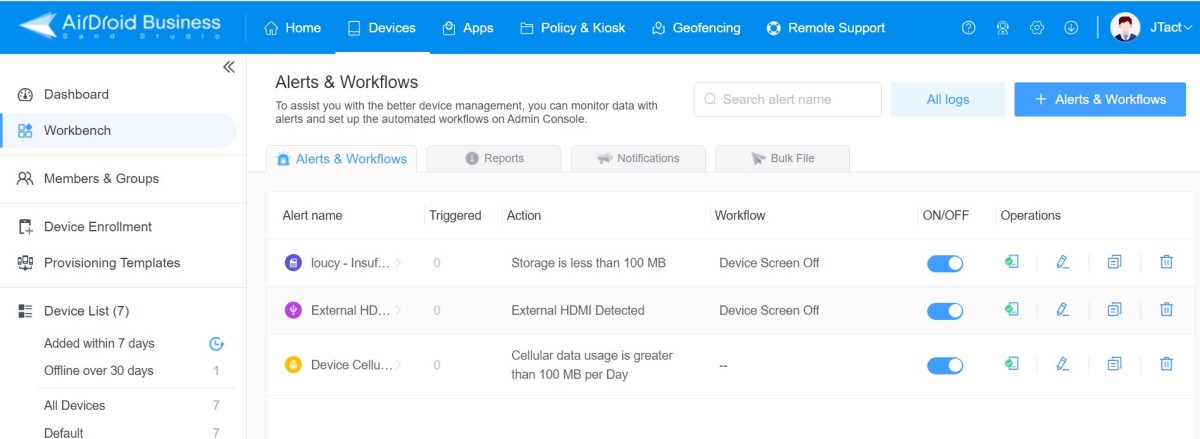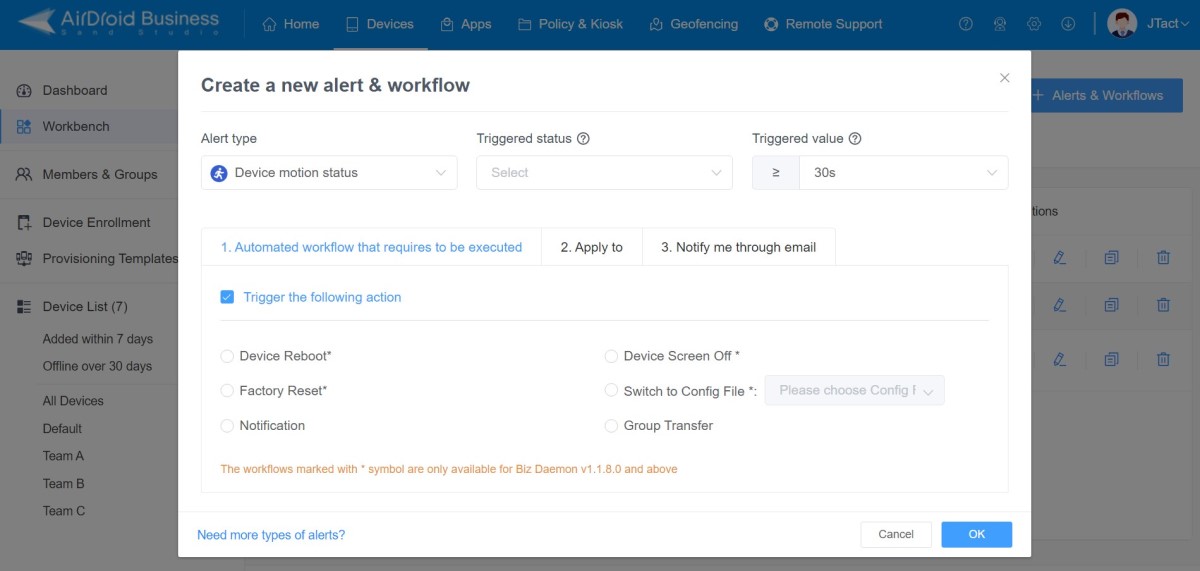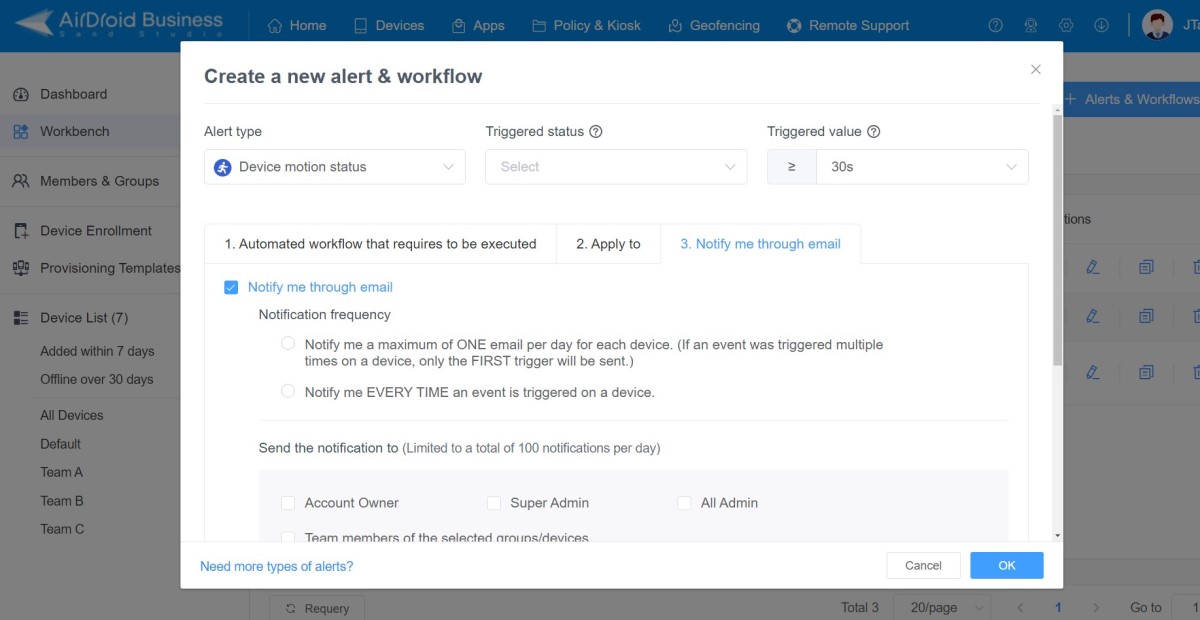[2024] 10 Powerful Android Automation Apps (Free & Paid)
Have you ever imagined how easy life could become if the daily repetitive tasks could be done automatically? For example, turning Wi-Fi on/off, informing your family when you leave the office, backing up files, controlling apps, etc.
Given the pace of today’s life, you cannot do without some degree of automation both at work and at home. Reliance on automation is going to soar manifold in the future. As McKinsey predicts, 50% of workplace activities will be automated by 2055.
The good news is, you can automate your day-to-day tasks by using automation apps. Whether you are using an Android phone, Apple device, Windows, or any other system, automation apps like Airdroid will do the tedious chores for you to help you save time and effort for the more productive tasks at hand.
In this article, you’ll learn what is an Android Automation App, what are the 10 best Android apps to automate tasks along with their prices and key features, and a candid comparison between them. Furthermore, a guide on how to deploy them is included as well.
- Part 1 : 3 Types of Android Automation App
- Part 2 : Common Use Cases of Automation Apps
- Part 3 : 10 Android Automation Apps(Free & Paid)
- Part 4 : How to Use an Automation App to Perform Tasks on Android Devices?
- Part 5 : Factors to Consider When Choosing an Automate Android App
- Part 6 : Pros & Cons of Using Automation Tools for Android
- Part 7 : FAQs

1What Is an Android Automation App?
Definition: Automation applications are tools used to automate tasks and processes on Android devices.
Purpose: Simplify user operations and improve device efficiency.
23 Types of Android Automation App
Before diving deep into the best automation apps and how they work, let’s first have a look at the three types of apps being used today for automation.
Task Automation Apps
This sort is the most common and is frequently used for work. These apps allow you to automate tasks instead of performing them yourself every time. They offer a visual interface or scripting capabilities that enable you to define and customize automated actions.
Since time is money, task automation apps aim to streamline routine tasks and allow enterprise users to focus on their business core while saving time on repetitive tasks. Moreover, they increase workflow productivity on your Android device automatically through user-defined rules and triggers.
Use Cases
- Document management (such as creating and archiving files).
- Cloud data backup.
- Application management (such as remote control or updates)
- Workflow automation.
- Automatic reply, such as text messages or reviews.
- Network connectivity management.
Home Automation Apps
These are the applications designed to remote control and manage the connected devices in the home. E.g. you can control smart speakers, security cameras, lights, thermostats, or doorbells with your mobile phone or tablet.
Use Cases
- Monitor home conditions.
- Automatically control home devices (such as lights and entertainment systems.)
- Smart home applications.
Social Media Automation Apps
Social media automation can help you save time and effort in social media management. These apps are dedicated to simplifying and optimizing various tasks and activities related to social interactions.
Use Cases
- Managing multiple social media accounts
- Scheduling posts
- Analysing performance

310 Android Automation Apps(Free & Paid)
Here’s a list of top ten automation tools you should try for optimal Android device management, including both paid and free options.
1AirDroid Business - Free trial for all features
AirDroid Business is one of the best solutions for Android device management. You can automate and remotely control all your Android devices flexibly and efficiently. By deploying Android devices to the admin console, you can easily apply automation functions and monitor the devices at the same time.
Key Features
- Monitor device status, location tracking, app usage, and data usage.
- Alerts & Automated Workflows
- App Management & Scheduled Test Release: install/uninstall, automatic update apps, launch apps on demand, etc.
- Real-time monitoring, file transfer & delete, Kiosk Mode & Browser, and Geofencing.
- Remote Access & Control e.g. automatic remote screen lock and remote wipe.
Pros
- A wide range of devices are supported, including smartphones, tablets, TVs, POS, kiosks, rugged devices, custom devices, media content boxes, home appliances, etc.
- Competitive pricing.
- Easy and simple user interface suitable for beginners as well.
Cons
- None
Official Website: https://www.airdroid.com/
2Tasker
Rating: 4.5 on Google Play
Tasker is another automation app that allows you to automate tasks by utilizing over 350 available actions for Android devices. It excels in its ability to automate tasks based on various contexts.
Key Features
- You can act to triggers based on specific times, dates, locations, events, or gestures.
- In addition to task automation, Tasker also offers features to help you back up files to your device or preferred cloud service.
Pros
- Real-time reporting.
- You can customize your tasks and processes to be automated.
Cons
- It has a comparatively complex user interface.
Official Website: https://taskerapk.net/
3Automate
Rating: 4.4 on Google Play
Automate is one of the free automation apps for Android, which is more beginner-friendly in contrast to other complex apps.
Key Features
- With Automate, you can manage files on your device and remote storage, backup files, and send/receive messages automatically.
Pros
- It provides a visual flow chart interface to create automation tasks that make it easier to understand.
- Ready made templates.
Cons
- Users report bugs quite often.
- Updates do not run seamlessly and are delayed.
Official Website: https://www.fortra.com/product-lines/automate
4MacroDroid
Rating: 4.1 on Google Play
MacroDroid, another Android automation app for newbies with a unique interface, offers a user-friendly Wizard guiding you step by step.
Key Features
- With MacroDroid, you can optimize your daily workflow on your phone e.g. automatically enable Bluetooth and start playing music when you enter your car or turn on Wi-Fi when you're near your house.
Pros
- MacroDroid is compatible with Tasker and Locale plugins, allowing you to create more advanced automation scenarios.
- With its intuitive interface, MacroDroid is a good choice for beginners looking to automate tasks on their Android devices.
- It supports a wide range of existing templates that can be customized to suit your needs.
Cons
- Free version has lots of ads and has a limit of 5 macros.
- it comparatively uses more battery.
Official Website:https://www.macrodroid.com/
5IFTTT
Rating: 4.6 on G2
Having integration with over 800 popular business and smart home apps, IFTTT is an Android automation app with seamless controls. It has over 17 million consumers in 140 countries across the globe.
Key Features
- It enables you to connect various apps and services through "applets" that perform a specific action based on a trigger. For example, you can post content across multiple social media networks, and connect and control every aspect of your smart home using IFTTT automation.
Pros
- It does not require coding.
- The interface is simple.
- It can be set up comparatively easily.
Cons
- It supports a limited number of apps.
- It is comparatively expensive.
Official Website:https://ifttt.com/
6AutomateIt
Rating: 4.2 on Google Play
If you need to automatically perform tasks on Android smartphones, AutomateIt is one of your prime options. It stands out with the user-friendly interface that allows you to create automation rules based on triggers and actions.
Key Features
- It provides you with a set of pre-installed rules to start with.
- You can create your own rules/triggers.
- It features a built-in market where users can share and download the rules they have created.
- With AutomateIt, you can easily view the statistics and set up an automated response to SMS messages while driving.
Pros
- It allows a lot of customization.
- It comes with some predefined triggers which are very handy.
Cons
- Its location trigger most of the time doesn’t work automatically.
Official Website:www.automateitapp.com
7E-Robot
Price: $ 0
Rating: 5 on Google Play
E-Robot, a powerful Android automation app, supports over 170 events and allows you to execute more than 150 types of actions.
Key Features
- It can handle various events, including location-based triggers, time-triggered events, application-handled events, scheduling, etc.
- E-Robot offers the flexibility of parameterizing all event and action types, making it a highly versatile app.
Pros
- Covering a wide range of trigger types is the biggest strength of E-Robot.
Cons
- When compared to many other apps, the UI of E-Robot is not as simple to navigate as it should be.
Official Website: https://erobot.ai/
8Atooma
Price: $ 0
Looking for an AI-powered automation tool for smartphones? Atooma is a tech startup in the field of Internet of Everything (IoE), based in Rome and Trento. It is an Android automation tool that revolutionizes your products with predictive context awareness.
Features
- With Atooma, you can create "if-this-then-that" rules to automate various tasks, such as automatically silencing your phone during meetings or sending automatic replies to specific messages.
- It also utilizes location-based triggers for automated actions e.g. you can send an automated notification to your family members once you step out of your office.
Pros
- If you are looking for efficient time-based and location-based triggers for performing automated actions, Atooma is one of the best options.
Cons
- There is a learning curve for the beginners.
Official Website: https://atooma.com/app-android.html
9Drupe
Price: $ 0
Rating: 4.2 on Google Play
Drupe is an Android app to automate tasks specializing in phone dialers and messages. In a word, Drupe provides automated functions such as an intelligent dialer and contact-based reminders to improve your communication experience.
Key Features
- It streamlines communication by offering a unified interface to manage calls, contacts, etc.
- It shows caller ID, spam call alerts.
Pros
- It supports a number of apps and a range of languages.
- Automatic blocking of spammers.
Cons
- The automated operations get quite confusing when more than one SIM is being used.
- Occasional lag.
Official Website: https://www.drupeengg.com/
10Zapier
Rating: 4.5 on G2
Zapier, an advanced workflow automation platform, helps you easily automate work in 5,000+ web apps without requiring any coding knowledge. With Zapier, you can automate tasks swiftly and eliminate the burden of repetitive activities that hinder your team's productivity.
Key Features
- It empowers you to connect the tools you commonly use seamlessly and construct custom workflows tailored to the way you work.
Pros
- No coding knowledge is required.
- Setting it up is easy and quick.
- Customized workflow management.
Cons
- It is comparatively highly-priced.
- It has a limited number of features.
Official Website: https://zapier.com/
4How to Use an Automation App to Perform Tasks on Android Devices?
An automation app needs the user to preset a triggered task (including the condition) so that to proceed with the automated processes. Triggers can be time, location, data usage, storage usage, etc.
As for a step-by-step guide, let's take AirDroid Business as an example.
- Step 1.Connect Android Devices with AirDroid Business.
- In the admin console, you can choose different enrollment methods to add devices to the manager.
- Step 2.Set Up Alerts.
- Go to Device - Workbench - Alerts & Workflows. Tap + Alerts & Workflows to configure triggered events.
- Step 3.Choose an Automated Workflow.
- You can configure: Device Reboot, Device Screen Off, Factory Reset, Policy File, etc.
5Factors to Consider When Choosing an Automate Android App
Tips of Choosing Android app to Automate Tasks
- Compatibility. Android devices come in various resolutions and hardware configurations. You should ensure the automation tool is compatible with the Android operating system versions you plan to support. In addition, it's significant to consider backward compatibility with older OS versions if you want to target a wider audience.
- Security. One of the truths you should know is that the automation process may involve accessing and interacting with sensitive data on your device. Therefore, it is crucial for you to pay attention to the security measures implemented by the automated Android app to protect your information and privacy.
- Pricing. It is one of the essential attributes you should evaluate based on the budget and cost you decide to invest. You can check the pricing model of the Android automation app, seeing if it offers a free version or a trial period to test its functionality. Besides, you can also assess whether the features and benefits of the app justify the cost of your personal automation Android requirements.
- Easy of Use. When looking for an Android app to automate tasks, you should consider whether it is user-friendly. It better has an intuitive interface and easy-to-understand documentation, allowing quick adoption and minimizing the learning curve.
- Customer Support. Think over the level of support provided by the automation app's developer. Check if they offer regular updates to address bugs, add new features, and improve performance. You should look for a developer who will be responsive to the feedback and provides timely support if you encounter any issues.
6Pros & Cons of Using Automation Tools for Android
Pros
● Time-saving and Efficient.
With an automation app, you can spend more time in prime business because it can handle the majority of mundane tasks on your behalf. Additionally, an Android automation tool helps you to streamline the workflows and improve efficiency. It can execute tasks quickly and accurately, reducing human error and improving overall productivity.
● Personal Customization.
These apps empower you to customize your Android device's features without the need for coding or programming skills. You can define triggers, actions, and conditions of automation rules to meet your requirement effortlessly.
● Task Consolidation.
Using an Android app to automate tasks can consolidate multiple missions into a single automation rule. For example, you can create an automation to silence your phone, enable Wi-Fi, and launch a specific app when you arrive at your office.

Cons
● Resource Consumption.
An automated Android app running in the background may consume system resources, such as CPU and battery power. It may impact device performance and battery life, especially if multiple automation rules are active simultaneously.
● Security and Privacy Concerns.
Since automation apps often require certain permissions to access device features and perform actions, granting these permissions can pose security risks. So, it's essential to review the permissions requested by the app and ensure they align with your trust and privacy preferences.








Leave a Reply.